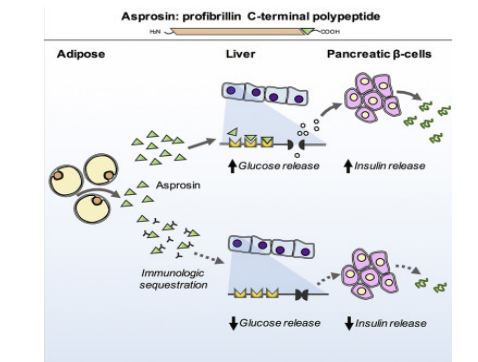Asprosin,a newly discovered hormone which associated with glucose regulation
Asprosin is a protein hormone that is produced by white adipose tissue in mammals, which is then transported to the liver and be stimulated for releasing of glucose into the blood stream. In the liver, asprosin activates rapid glucose release by a cAMP-dependent pathway. (Figure 1)

Figure 1. Asprosin’s mode of action (Cited from cell )
This year, an article published in Cell reveals the discovery of Asprosin. The intention of this article is to study Neonatal Progeroid Syndrome (NPS), never thought in the process, they found a hormone - Asprosin, which is associated with type 2 diabetes. We will briefly introduce the discovery of this protein below.
NPS is a genetic disorder, the patients’ fat will be accumulated. In the process of research, researchers found that the NPS patients’ C terminal ends of pFBN1 (profibrillin) will be cut in the coding, and the sequence which are cut was named Asprosin. People with neonatal progeroid syndrome lack asprosin, and reduced hepatic glucose released into the blood stream, so these patients showed very low plasma glucose and insulin levels.
Obesity/diabetic people with high plasma glucose and insulin levels have asprosin in abundance. Chopra’ s team also found that obese people have twice as much asprosin in their blood than people who are not obese. It’s likely that as fat levels go up, asprosin goes up, too. The researchers thought when antibodies target asprosin, the hepatic glucose released into the blood stream will be reduced, a small amount of insulin released by pancreas cells will be improved.
It is worth mentioning that asprosin is generated from the gene FBN1 (amino acid residues 2732–2871), which also generates fibrillin 1. The fibrillin 1 protein was isolated by Engvall in 1986. Cloud-Clone Corp. has developed the fibrillin 1 protein related products, such as RPA593Hu01、PAA593Hu01、SEA593Hu、SCA593Hu, etc. The fibrillin 1 protein is a huge glycoprotein which can bind calcium ion in microfibrils of connective tissue, and mutations in the gene have been linked to the Marfan syndrome. Marfan syndrome is a genetic disorder of the connective tissue. People with Marfan tend to be tall, with long arms, legs, fingers and toes. The most serious complication is cardiovascular abnormality.
Cloud-Clone Corp. is committed to the development of asprosin related products, your consultation are always welcomed.
More products, please visit: http://www.cloud-clone.us/.


